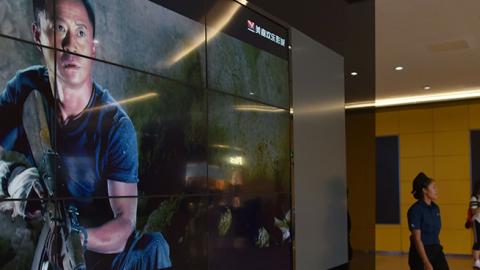“Don’t kill the Chinese,” exclaims the African rebel leader, “it is big trouble.” And big trouble it becomes for the rebels as they face Leng Feng, the ex-PLA special ops, one-man army, aka Wolf Warrior, who heroically rescues a group of Chinese factory workers caught in the mayhem of civil war inside an African country.
This, in short, is the plot of Wolf Warrior II, already one of the biggest Chinese box office hits ever, even though it was just released this summer. It also happens to be the theme of “China’s Strong Arm – Protecting Citizens and Assets Abroad,” a book that I co-authored on China’s growing protection of nationals in risky areas. It isn’t every day that your foreign policy analysis resembles a blockbuster film.
The backdrop for both film and book is an African landscape shaped by Chinese foreign investment. Chinese workers numbering in the millions are building roads and developing oil fields in fragile parts of Africa. Their presence abroad creates a new risk map for Chinese interests as these workers and businesses become embroiled, often unwillingly, in local conflicts.
One of the largest Chinese interventions occurred in 2011, when the country rescued more than 47,000 Chinese in peril abroad. The bulk came from the more than 35,000 Chinese workers who were rescued from Libya as it descended into chaos in the uprising against Moammar Gadhafi. For China’s government, which does not typically intervene in such a way, it was an uncommon approach to deploy military planes and a frigate in the rescue.
Protection of Chinese nationals abroad was added to the official Chinese foreign policy playbook at the Party Congress in 2012. The military also lists protecting nationals overseas as part of its novel contingency missions. The protection of nationals abroad is also a matter of public opinion, which is amplified by nationalistic media outlets such as the Global Times and on social media. This further prods the Chinese government to step up.
Back to the movie. “We are Chinese,” exclaims one of the local Chinese shop owners as a badge of protection, fleeing to safety. The shop owner and other fleeing Chinese are greeted by the Chinese ambassador, fully in charge, as he defuses a tense stand-off with rebels outside the embassy. “China and Africa are friends,” exclaims the ambassador in boiler-plate official speak, while facing a couple of loaded AK-47s. In this case, it works.
In the harbor, Chinese frigates take on the fleeing nationals, but other Chinese remain at a Chinese-run hospital (with the very Christian name St. Francis) and at a factory in the countryside. The frigate captain makes it clear that China can’t intervene further to save more China nationals without U.N. authorization. This is quite realistic but differs from say American action movies like Rambo, where U.N. legitimacy would hardly register. Still, our protagonist Leng Feng goes on an unauthorized but tacitly acknowledged one-man rescue mission.
The deployment of Chinese frigates is also realistic. Since 2009, the Chinese navy has been present in the international anti-piracy mission in the Gulf of Aden. The country deployed frigates for the evacuation mission in Libya in 2011, while four years later in Yemen, two frigates led a rescue operation dramatically named “Noah’s Ark.” China’s new military presence in Djibouti is also to be seen in light of such future contingencies on the African continent.
What is still currently unrealistic is to expect China to deploy without local government consent or the United Nations. In the movie, the Chinese ambassador calls an African president appealing for the protection of Dr. Chen, a Chinese doctor working on a vaccine for a local killer virus. Similarly, Leng Feng captures harrowing images of the slaughter of Chinese by the rebels on his Chinese smartphone (yes, product placement goes beyond Hollywood.) This evidence is presented to secure U.N. authorization so that the Chinese frigates can fire at rebels surrounding the Chinese factory, which Leng Feng is heroically protecting.
What does the Chinese protection of nationals reveal about the evolution of Chinese foreign policy? There is a benign answer and a more malign answer for the international community.
In the negative version, protection of Chinese nationals abroad leads to a narrow pursuit of Chinese interests with a patriotic tinge. This could be seen somewhat in Libya in 2011. Simultaneously with the rescue of Chinese workers, other Chinese state-owned companies were busy trying to sell weapons to the dying Gadhafi regime. In Wolf Warrior II, that is reflected in the final rescue scene, where Leng Feng raises the Chinese flag on his extended arm while standing on top of an open truck. The scene reportedly made moviegoers in China break out singing the national anthem. The flag has the desired calming (or scaring) effect on the rebel aggressors. “It’s the Chinese!” they exclaim, and the warring forces hold fire to let the convoy of Chinese pass through. Leng Feng, the rogue Rambo character, becomes the 21st Century update of Lei Feng, the patriotic soldier icon of the Communist era.
In a more benign vision, China’s growing protection of nationals leads Beijing to promote stability and conflict resolution (in part simply to avoid costly rescues). China’s engagement in South Sudan is a case in point, where a Chinese oil pipeline has led to a longstanding engagement. China now fields a large part of the U.N. mission in South Sudan, including combat troops, and is engaged in shuttle diplomacy to mediate the internal conflict. In Wolf Warrior II, we see this benign vision when the Chinese factory workers insist on bringing African co-workers and their spouses to safety. China’s protective arm extends beyond its own. Similarly in Yemen in 2015, Chinese warships rescued 279 foreign nationals.
At the end of the film, the screen is filled by a close-up of a Chinese passport. How China chooses to protect its nationals abroad has ramifications for China’s ascent to great power status. Xi Jinping’s One Belt, One Road initiative, which sees Chinese businesses venturing into unstable areas across the globe, will magnify these challenges for years to come. With that in mind, do go watch Wolf Warrior II. Or read the book.

















